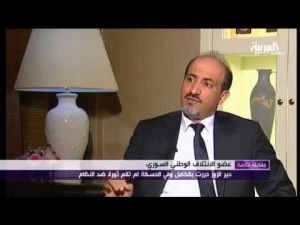 Russia said on Monday that remarks by the new leader of the opposition Syrian National Coalition have raised questions about his dedication to a political solution of the conflict, and urged the group to commit to attending a peace conference.
Russia said on Monday that remarks by the new leader of the opposition Syrian National Coalition have raised questions about his dedication to a political solution of the conflict, and urged the group to commit to attending a peace conference.
Ahmad Jarba, elected president of the coalition on Saturday, told Reuters the opposition would not go to the conference that Russia and the United States are trying to convene in Geneva unless its military fortunes improve.
“The first statements by the new leader of the National Coalition … raise a whole series of questions about its prospective actions and, most important, about its commitment to a political solution of the prolonged crisis in Syria,” Foreign Ministry spokesman Alexander Lukashevich said in a statement.
“What is needed from the new leadership of the National Coalition is a clear and unequivocal expression of readiness to send representatives to the peace conference in Geneva,” he said in a statement. He added that Russia was open to establishing contacts with the opposition group’s new leadership.
Russia and the United States announced on May 7 that they would try to bring Syrian government and opposition representatives together at a international conference to seek an end to a war that has killed more than 100,000 people since March 2011, but no date has been set.
Russia, which has given crucial diplomatic support to Syrian President Bashar al-Assad during the conflict and says his exit from power must not be a precondition for peace talks, has suggested that the main obstacles to the conference are disunity and a lack of commitment among the opposition.
About Ahmad Jarba
The new head of the National Coalition for Syrian Revolutionary and Opposition Forces, is an influential tribal figure who has close links to Saudi Arabia.
A Sunni Muslim, Jarba was born in 1969 in the north-eastern Syrian city of Qamishli, in Hassakeh province. The province is home to Arabs and Kurds.
He is a member of the Shammar tribe, one of the most prominent tribes in eastern Syria. The Shammar also has a presence in Iraq, Saudi Arabia and Jordan.
Jarba was politically active in the 1990s and was imprisoned between 1996 and 1998 for opposing President Bashar al-Assad.
He was jailed again in March 2011, at the start of the current uprising, for supporting pro-democracy protests. Jarba left for neighbouring Lebanon that August, after his release.
He has subsequently spent time in Saudi Arabia and is believed to maintain close ties with the Gulf kingdom’s leadership.
Jarba has played a vital role in bridging the gap between tribes in eastern Syria and the opposition.
He is close to the faction of Syrian secular dissident Michel Kilo, who has sought to gain the support of minority groups in the face of a possible Islamist takeover.
Jarba was a member of the opposition Syrian National Council (SNC), before joining the coalition, but suspended his membership of the National Coalition in March 2013, following the election of of Ghassan Hitto as prime minister of the organisation’s interim government.
According to the National Coalition’s Facebook page, Jarba “has been supporting the Syrian revolution, providing medical and military aid, since the beginning of the revolution”. He has also been a “key figure in establishing political diplomacy”, it says.
Hitto resigned on Monday , 2 days after Jarba defeated theQatari backed candidate
Reuters/BBC

Leave a Reply
You must be logged in to post a comment.